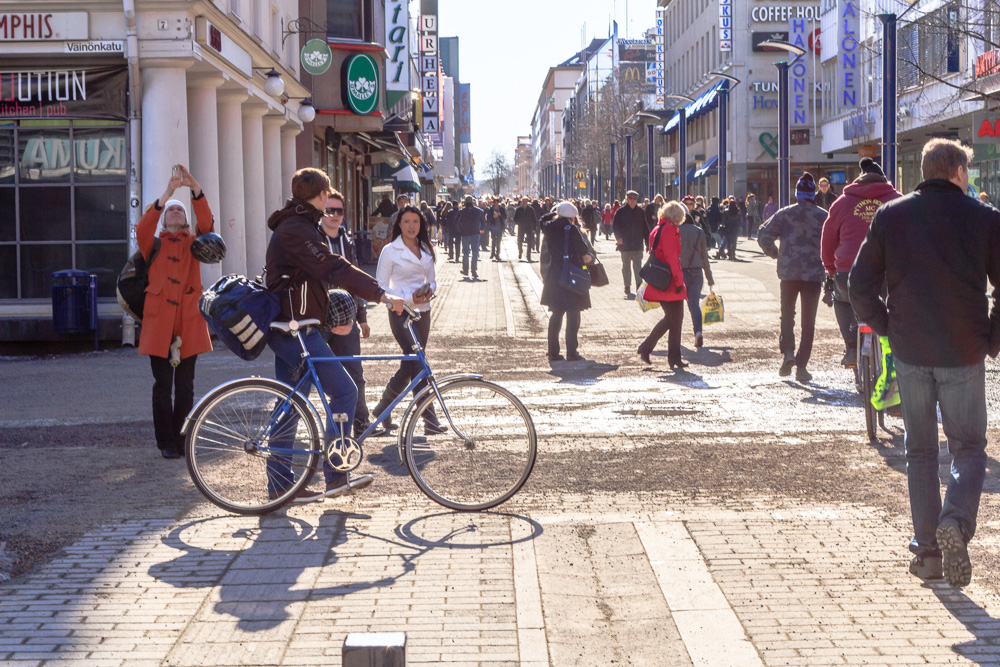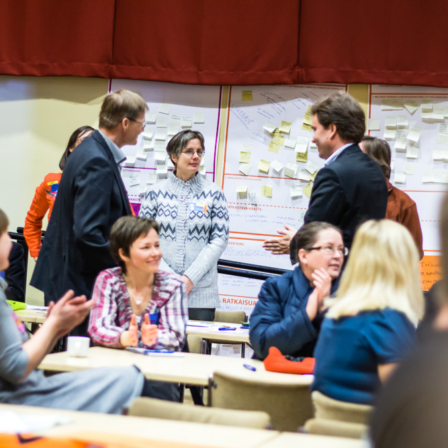The National Resource Wisdom forum brought more than 300 municipal decision-makers and resource efficiency experts to Finlandia Hall in December.
Those cities that use resources efficiently will succeed the most in the future. This was the theory being discussed on 4 December by a big group of local decision-makers, city officials, representatives of public utilities, entrepreneurs and resource wisdom experts.
The popularity of the forum surprised the organiser, Sitra. The event had planned for 300 attendees, but the number enrolling came close to 400 The event was also broadcast online via Sitra’s website.
“There is more and more demand for resource efficiency, natural resource issues and cuts in emissions. Finland has been one of the backmarkers with regard to EU resource efficiency statistics, but we have now realised that the wise use of resources and energy saving are extremely important to the economies of municipalities and in terms of reducing emissions,” says Johanna Kirkinen, Sitra’s Senior Lead.
According to Sitra, Finland must start preparing more for the depletion of natural resources and the problems caused by climate change. The time of abundant cheap resources will soon be over, and we will see an increase in the price of raw materials, energy and minerals. The scarcity of resources and the instability of prices is a problem which also has a negative effect on the economy. Finland needs to see a change in terms of production and consumption. A change which, for the first time, is based on less use of energy and raw materials.
“The current wastage simply cannot go on,” says Jukka Noponen, Director of Sitra. “We will have to start saving resources and using them wisely. But instead of making this a negative thing, we are trying to make the cities aware of the opportunities for Finland to succeed in the new situation.”
According to Noponen, the wise use of resources provides cities and businesses with an edge and with new business opportunities, when compared to developing economies, where the use of many natural resources is even more wasteful and resource efficiency is only being introduced. “When China eventually wakes up and faces the environmental problems, we might already have the solutions. Resource wisdom reduces the dependence on raw materials and energy and the increase in prices, which is important to municipalities, especially in this challenging economic situation,” he adds.
Sitra invited a group of top Finnish and foreign speakers to Finlandia Hall, who explained how in the future, Finnish cities can be made engines of economic growth and pioneers of the sustainable use of natural resources. The speakers included Xaver Edelmann, the founder and President of the World Resources Forum, Per Mickwitz, Head of Research at the Finnish Environment Institute, Sirpa Pietikäinen, a resource efficiency expert and Member of the European Parliament, Anna-Kaisa Ikonen, the Mayor of Tampere, Laura Höijer, Head of Research at the Ministry of the Environment, Mika Mäkeläinen, entrepreneur and the author of the book Taivas+Helvetti, and Markku Andersson, the Mayor of Jyväskylä.
In Germany, for instance, resource wisdom is part of everyday life, and resource- and energy-saving practices are being developed at full speed in both the public and private sectors. Germany has been able to eradicate the correlation between the consumption of natural resources and economic growth: between 2000 and 2010, the German economy expanded, while at the same time the consumption of natural resources decreased by 11 per cent. Professor Dieter D. Genske also joined the forum to speak about the example set by the Swiss city of Basel.
Sitra has chosen Jyväskylä as the Finnish experimental area for its resource wisdom project in order to develop the operating model for a resource-wise city. In the operating model, a city is able to save natural resources, decrease emissions and improve its inhabitants’ well-being.
In Jyväskylä, the model is being developed together by city officials, public utilities and residents via tests and pilot projects to find operational ways to save natural resources. Businesses in the area are being encouraged to build closed-cycle systems, utilise refuse as raw material, share logistics and develop material and energy-efficient procedures.
More information on Jyväskylä’s Towards Resource Wisdom project (Kohti resurssiviisautta) can be found here.
The programme and speaker introductions of the National Resource Wisdom forum as well as the link to the webcast can be found here (in Finnish).





Recommended